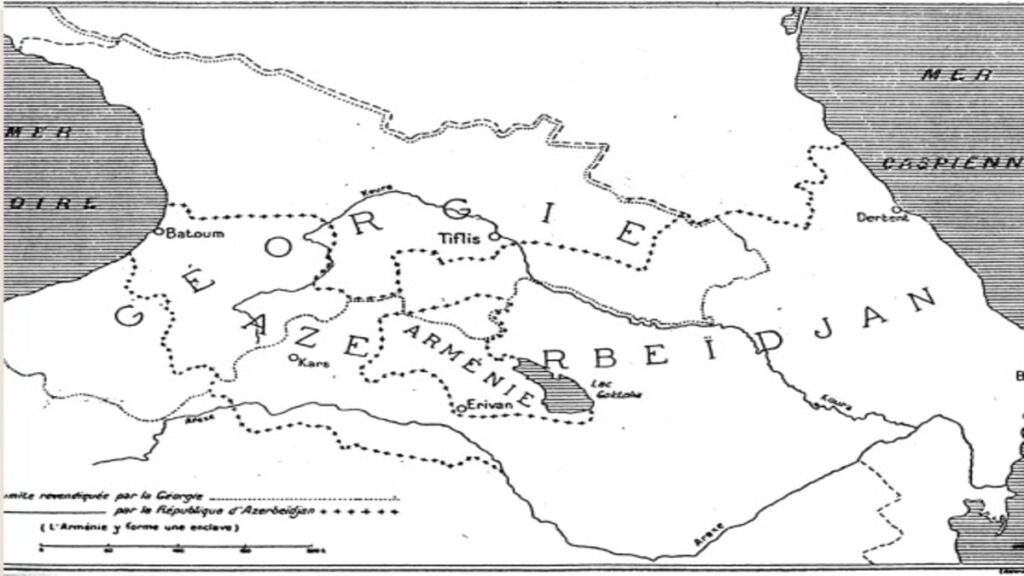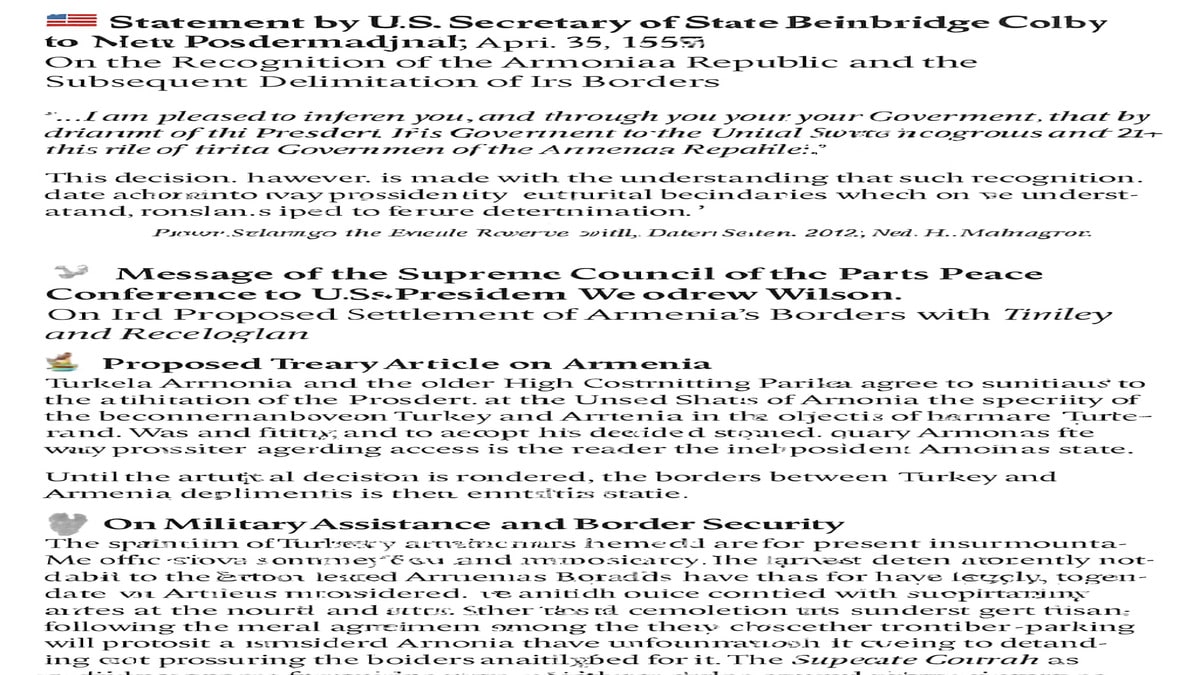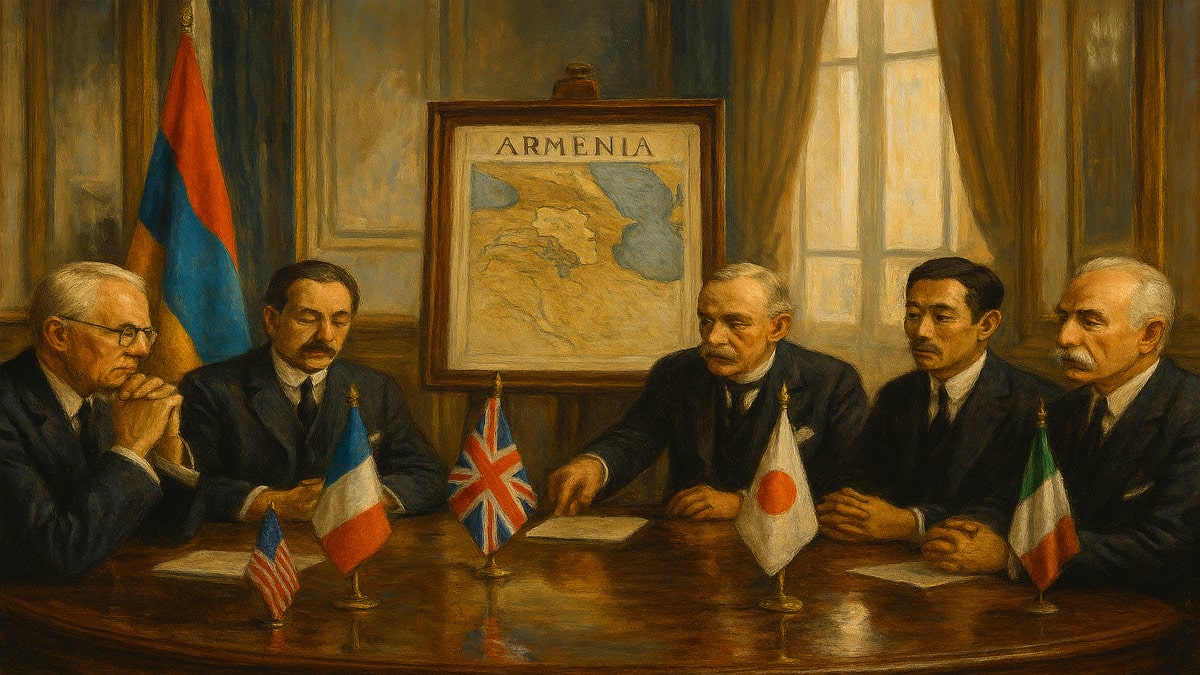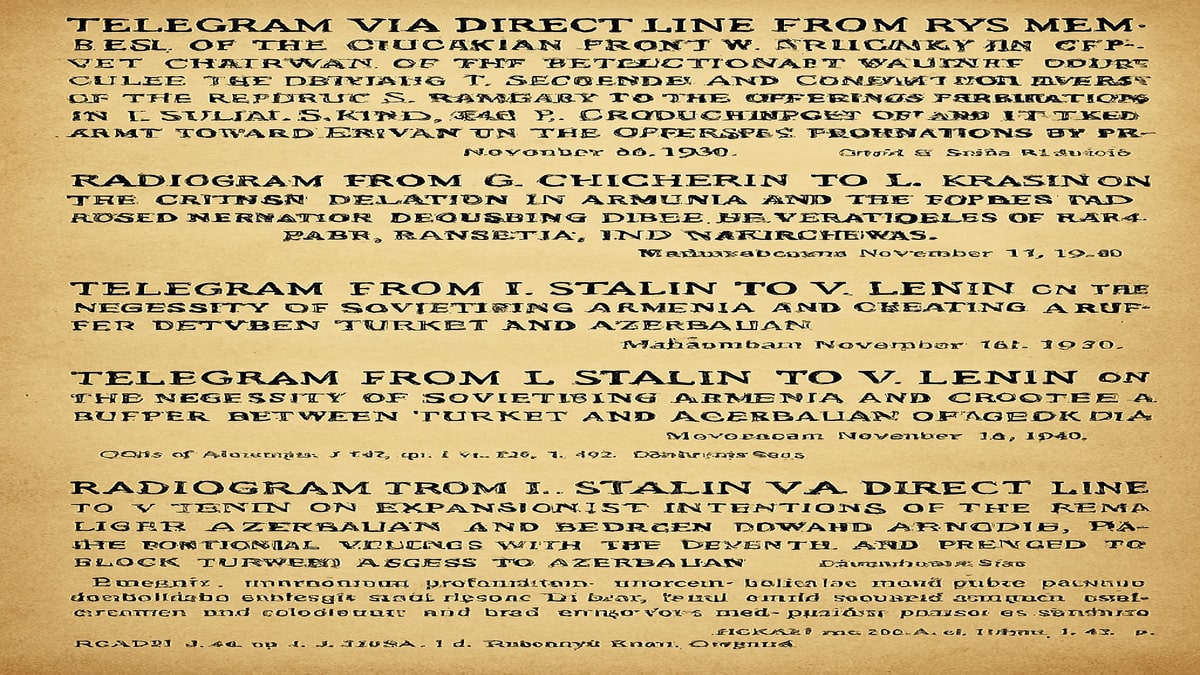
Oral Inquiry by R. MacDonald in the British Parliament and the Response by Foreign Secretary A. Balfour July 11, 1918
Ramsay MacDonald asked the Foreign Secretary whether he was aware of the resistance being mounted by the Armenians against the Turkish army, which was attempting to destroy the Armenian Republic following its declaration that it would not accept the provisions of the Brest-Litovsk Treaty concerning Armenia. He further inquired whether the Allied governments were committed to doing everything in their power, when the time came for postwar settlement, to ensure that Armenia’s future would be determined on the basis of the principle of self-determination.
Balfour replied: “Yes, Sir; His Majesty’s Government is following with the utmost seriousness and admiration the courageous resistance of the Armenians in defense of their liberty and honor, and is doing everything possible to assist them. As for the future of Armenia, I would remind the honorable Member of the public declarations made by leading statesmen of the Allied Powers in favor of a settlement based on the principle he has mentioned.”
The Parliamentary Debates: Official Report. Fifth Series – Volume 108. 8th Session of the 30th Parliament. Sixth Volume of Session 1918. London, July 11, 1918. p. 473.
Letter from the President of the Council of Ministers of France, Georges Clemenceau, to the Head of the Armenian National Delegation, Boghos Nubar Pasha July 23, 1918
“France, herself the victim of the most unjust aggression, has included in her demands the liberation of enslaved nations. As the traditional protector of these peoples, she has repeatedly expressed her deep sympathy for the Armenians and has done everything possible to assist them.
I am pleased to confirm to you that the Government of the Republic, like that of Great Britain, continues to regard the Armenian nation as one of the peoples whose fate the Allied Powers intend to settle in accordance with the right of nations to self-determination.”
Archives of the Ministry of Foreign Affairs, E-Levant 1918–1929, Armenia, Vol. 1, ff. 80–80v. (Emphasis added – Y.B.)
From the Speech of George Greenwood in the British House of Commons Debates on the Fate of Armenia November 18, 1918
“…I believe the armistice stipulates that in the event of unrest in Armenia, the Allies should send troops to occupy part of that territory. I do not know how accurate this is, but we are told that serious disturbances are occurring there, and that the Turks, together with Tatar forces—who are their ethnic kin—are still attempting, in certain areas, to carry out the old Turkish policy aimed at resolving the Armenian question by exterminating the Armenian people. If this is true, then I hope we can, if no action has yet been taken, put an end to it by dispatching troops to that country.
…I hope that the prudent Lord will be able to assure us that if these reports are accurate and Turkish atrocities are still being committed in parts of Armenia, then troops may be sent to occupy the country. I believe we must do this for the sake of the Armenians and in the name of justice.”
The Parliamentary Debates: Official Report. Fifth Series – Volume 110. 8th Session of the 30th Parliament. House of Commons. 8th Volume of Session 1918, October 15 – November 21, 1918. London, 1918.
🇺🇸 U.S. Senate Resolution No. 378
On the Territorial Composition of a Reconstituted Armenia Introduced by Republican Senator Henry Cabot Lodge December 10, 1918
Resolved, that in the opinion of the Senate, Armenia—including the six vilayets of Turkish Armenia and Cilicia, Russian Armenia, the northern part of the province of Azerbaijan, and Persian Armenia—should be independent, and that the Senate hopes the Peace Conference will take appropriate measures to assist Armenia in establishing an independent republic.
Congressional Records, December 10, 1918
🗺️ Schematic Map of Territorial Claims
Prepared by a Private Cartographer Commissioned by the Azerbaijan Democratic Republic For Presentation at the Paris Peace Conference, 1919
🛡️ Discussion on the Security of the Armenians of the Caucasus
At the Meeting of the Supreme Council of the Peace Conference With Delegation Heads of the Five Great Powers: United States, British Empire, France, Italy, and Japan Paris, August 11, 1919
During the session, a telegram was read from Colonel Gaskell, the American High Commissioner of the Entente in Armenia, urging the postponement of the full withdrawal of British troops from the Transcaucasus, scheduled for August 15. According to Gaskell, this measure would terminate all “relief efforts, without which thousands of Armenian refugees in Russian Armenia are doomed to die of starvation. The Armenians are surrounded by enemies and lack sufficient arms, ammunition, or forces to defend themselves. Once British troops depart, the lives of two million Armenians will be in jeopardy; anarchy will engulf the Caucasus, where both lives and property are at risk.” Gaskell appealed to the British government to rescind the evacuation order in the name of the region’s future.
Since Italy, France, and the United States declined to replace the British forces in the Transcaucasus for various reasons, the session’s chair, Georges Clemenceau, concluded the discussion with the following words: “It remains to be seen whether any Armenians will survive as a result of this.”
Documents on British Foreign Policy, 1919–1939, First Series, Vol. I, 1919, London, H.M.S.O., 1947, pp. 389–390 (Emphasis added – Y.B.)
⚠️ President Wilson’s Warning to the Turks
Regarding Possible Sanctions for Massacres of Armenians in the Caucasus (Transmitted via Telegram from U.S. Secretary of State Robert Lansing to the U.S. Commission at the Peace Negotiations in Paris) August 16, 1919
Concerning your telegram No. 3629 (date of dispatch not marked), received August 12, and previous communications regarding the danger facing the Armenians:
The President wishes to warn the Turkish authorities that unless they take immediate and effective measures to prevent any massacres or other atrocities committed by Turks, Kurds, or other Muslims against Armenians in the Caucasus or elsewhere, they will forfeit any support regarding the retention of sovereignty over the Turkish portion of the present Ottoman Empire, as outlined in Article XII of his peace terms. Such a decision could lead to the complete dissolution of the Turkish Empire and a fundamental revision of the conditions for peace.
Should the Turks object that they lack control over such events, it must be made clear that if they hope to retain sovereignty over any part of the Empire, they must demonstrate not only willingness but also the capacity to prevent atrocities within their territory against people of other nationalities and religions.
Therefore, no justification from the Turks regarding their inability to prevent atrocities against Armenians will be accepted. Please communicate this to the Turkish authorities through whatever diplomatic channels you deem appropriate, and in any case, inform Admiral Bristol [U.S. High Commissioner in Constantinople – Ed.] of the contents of this telegram for transmission to the Turkish authorities.
Papers Relating to the Foreign Relations of the United States, 1919, Washington, 1934. Vol. II, pp. 831–832
📎 Appendix “E” to Protocol No. 42
Meeting of the Heads of Delegations of the Five Great Powers at the Peace Conference with Representatives of the United States, British Empire, France, Italy, and Japan Paris, August 25, 1919
To the American Commission at the Peace Negotiations
Telegram from the French High Commissioner in Constantinople regarding the actions of Admiral Bristol, who made representations to the Turkish government without prior consultation with the Inter-Allied Supreme Commission.
Translation [from French], August 23, 1919
Admiral Bristol, recently appointed as the U.S. High Commissioner in Constantinople, sent a critical memorandum to the Grand Vizier on August 22 of this year, without consulting the Allied High Commissioners.
Below is a summary of the note:
“President Wilson informs the Turkish government that unless urgent measures are taken to end all violence or massacres committed by Turks, Kurds, or other Muslims against Armenians in the Caucasus or elsewhere, the President will remove Article 12* from the peace terms. Such a decision would result in the complete dissolution of the Ottoman Empire. If the Turks wish to retain any sovereignty over any part of the Empire, they must demonstrate not only their intent but also their ability to prevent their citizens from committing such atrocities. No excuses or claims of impotence on the part of the Turks will be accepted.”
The Grand Vizier forwarded this memorandum to the British and French High Commissioners. He expressed deep concern, stating that he lacks the authority to control the forces necessary to maintain order or the financial resources to pay soldiers and officials. He is in a state of despair. He also noted that America—a country that did not wage war against Turkey and did not sign the armistice agreement—issued this authoritative warning independently and without the involvement of the Allied Powers.
This article concerns the preservation of Turkish sovereignty over part of the Ottoman Empire’s territory.
Documents on British Foreign Policy, 1919–1939, First Series, Vol. I, 1919, London, H.M.S.O., 1947, pp. 524–525 (Emphasis added – Y.B.)
📡 Telegram from U.S. Secretary of State Robert Lansing
To Ambassador Davis in London on the Need to Protect Armenians from Extermination August 26, 1919
“…3. The deportation and massacre of Armenians in 1915 and 1916 were primarily driven by the Young Turks’ desire to create a homogeneous Turkey. Pan-Turanian and pan-Islamic ambitions among the Turks still persist… Armenians and the establishment of an Armenian state were viewed by the Turks as a serious obstacle to the realization of these ambitions, especially the Pan-Turanian ones. It therefore seems to be in the interest of Great Britain and the other Allies to assist the Armenians and protect them from annihilation.”
Papers Relating to the Foreign Relations of the United States, Washington, 1934, pp. 836–837
⚠️ Telegram from Colonel W.M. Gaskell, U.S. High Commissioner of the Allied Powers in Armenia
Criticizing British Policy Toward Armenia Addressed to the President of the Peace Conference Presented at the Meeting of the Heads of Delegations of the Five Great Powers Paris, August 29, 1919 Appendix A to Protocol No. 46 of the Meeting on August 29, 1919
Priority – Tiflis 715-182-18-17 via Malta To the President, Peace Conference Council, Paris
I have personally examined the situation in Armenia and found conditions to be appalling and indescribable. Timely aid could reach those in need and prevent starvation. If you support with troops, cavalry would be most suitable, if available. If not, a reinforced infantry brigade could save the situation in Russian Armenia.
Tatars are attacking from the east and south, and internal uprisings are growing stronger daily. The arrival of even a single regiment could determine the fate of our Armenian allies, who may be annihilated at any moment if troops are not deployed. The British are now withdrawing from the Caucasus and have already refused even temporary use of their forces in Armenia, citing orders from above that prohibit the deployment of any British troops on Armenian territory.
If British policy excludes the protection of Armenians—as evidenced by the situation described—then that policy must be changed, or other forces must be deployed immediately. British forces here now consist mainly of Indian troops. Please confirm receipt of this telegram.
W.M. Gaskell, Colonel, U.S.A., High Commissioner of the Allied Powers in Armenia (Discussion of the telegram was postponed)
Documents on British Foreign Policy, 1919–1939, First Series, Vol. I, 1919, London, H.M.S.O., 1947, p. 574 (Emphasis added – Y.B.)
📜 From the Proclamation of the Allied High Commissioner
Colonel William Gaskell on the Establishment of Allied Administration in the Disputed Districts of Nakhichevan and Sharur October 25, 1919
In view of the fact that peace, personal safety, and property security in the districts of Sharur and Nakhichevan have been disrupted by armed clashes between Armenians and Azerbaijanis—conflicts arising from competing territorial claims by Armenia and Azerbaijan—and in view of the fact that the question of rights over the Sharur and Nakhichevan districts has not yet been resolved by the Peace Conference, and further considering that the governments of Armenia and Azerbaijan have been unable to reach a mutual agreement regarding possession of this territory or to maintain peace therein…
I, William N. Gaskell, by the authority vested in me by the Peace Conference, acting as High Commissioner of the United States of America, France, Great Britain, and Italy, hereby decree the following:
- The districts of Sharur and Nakhichevan shall constitute a zone of Allied administration under the leadership of an American governor.
<…>
Colonel, General Staff of the United States Army Allied High Commissioner William Gaskell
Officially: Colonel, General Staff of the United States Army Chief of Staff, Ray
Sources: The Struggle for Soviet Power in Azerbaijan, 1918–1920. Baku, 1967. Doc. 375, pp. 315–316; The Republic of Armenia in 1918–1920 (Political History). Collection of Documents and Materials. Yerevan: Gitutyun, 2000. No. 124, pp. 134–135. 590
Yuri Barsegov “Nagorno-Karabakh in International Law and Global Politics”
Artatsolum
Read Also:
- Ancient and Medieval Sources on Artsakh (Karabakh) as Part of Armenia’s State Territory
- Message from Gandzasar Catholicos Esayi to Peter I August 10, 1716
- Memorandum Issued to Ivan Karapet Along with the Imperial Letter to the Armenian People Regarding Russia’s Readiness to Take the Armenians of Karabakh Under Its Protection June 3, 1723
- Decree of Peter I to the Armenian People Regarding Russia’s Willingness to Offer Protection to the Armenians of Karabakh
- On Armenian Hopes for Russian Assistance
- Report of Minas Vardapet to Peter I
- Contents of the Secret Letters from the Armenian Assembly and the Armenian Army of Karabakh to the Russian Emperor and Chancellor August 1724
- Contents of the Secret Letters from the Armenian Assembly and the Armenian Army of Karabakh to the Russian Emperor and Chancellor August 1724
- State Charter of Peter I On the Acceptance of the Armenian People Under the Protection of the Russian State and Their Resettlement from Karabakh to Newly Acquired Persian Provinces November 10, 1724
- Letters from the Catholicos and the Meliks of Karabakh
- Charter of Catherine I Addressed to the Armenian Assembly
- Message General Mkhitar—to the Russian Government
- The Armenian Assembly’s Request for Military Assistance June 19, 1727
- Result from Russia’s failure to fulfill its promises of assistance to the Armenians March 1736
- On the Issuance of the Decree Appointing Panah Khan
- Letter from General Potemkin to Prince Argutinsky with questions about the liberation of Armenia
- Appeal of Gandzasar Catholicos Hovhannes to Catherine II
- Letter from Melik Apov Iosifov to Provide Assistance to Russian Military Forces for the Liberation of Enslaved Karabakh
- Report of Prince G. Potemkin to Catherine II
- Request of General P. Potemkin to Prince G. Potemkin
- Letter from Archbishop Joseph Argutinsky to General P. Potemkin
- Memorandum to Catherine II on the Project for the Restoration of the Armenian Kingdom
- Decree of Paul I to General Count I. Gudovich
- Letter from Archbishop Joseph Argutinsky
- Report by State Councillor P. Kovalesky
- The Khan’s Vizier, Mirza Jamal Javanshir Karabakhsky
- From the Report of General Marquis Palluci to Alexander I
- The Gulistan Treaty – An Interstate Act of Iran’s Cession of the Karabakh Territory to Russia
- Report of General A. Yermolov to Alexander I Requesting the Waiver of Tax Arrears for the Karabakh Khanate
- LETTER FROM GENERAL A. YERMOLOV TO MEHTI-KULI KHAN
- Directive from General A. Yermolov to General I. Velyaminov
- Letter of Metropolitan Sarkis Hasan-Jalalyan To General A. Yermolov
- Letter from General I. Paskevich
- TREATY CONCLUDED BETWEEN RUSSIA AND PERSIA AT TURKMENCHAY
- Russian Military Historian V. Potto on the Essence of the Treaty of Turkmenchay
- Order of General I. Paskevich to Colonel L. Lazarev
- STATEMENT ON THE DIFFERING ATTITUDES OF ARMENIANS AND TATARS TOWARD THE ANNEXATION OF KARABAKH TO RUSSIA
- REPORT By the Acting Uezd Chief of the Dzhevanshir Uezd, D. Baranovsky
- From the Memoirs of a Member of the Russian National Council in Baku (1918–1919)
- “TREATY OF PEACE AND FRIENDSHIP” Between the Ottoman Empire and the Republic of Armenia
- Letter from A. Mikaelyan, Representative of the Karabakh and Zangezur Fellowship
- Note of Protest from the Ministry of Foreign Affairs of the Republic of Armenia
- Appeal of the Karabakh Armenian National Council To the Commander of Allied Forces in Baku
- LETTER FROM THE CHAIRMAN OF THE KARABAKH ARMENIAN NATIONAL COUNCIL
- Turks in Shushi
- Letter of Welcome from the Karabakh Armenian
- LETTER FROM GENERAL BAGRATUNI
- FROM THE MESSAGE OF THE ARMENIAN TELEGRAPH AGENCY
- REPORT FROM THE DIPLOMATIC REPRESENTATIVE OF ARMENIA IN GEORGIA
- Resolution of the Fifth Congress of Armenians of Karabakh
- Report by Prime Minister Hatisov to the Council of Ministers of Armenia
- FROM THE MEMORANDUM OF THE KARABAKH ARMENIAN NATIONAL COUNCIL
- 🇬🇧 ANNOUNCEMENT OF THE BRITISH MILITARY MISSION IN SHUSHA
- From the Memorandum of the Armenian Representative to the British Military Mission in Shusha
- Report from the Office of the Governor-General of Karabakh
- NOTICE FROM THE REPRESENTATIVE OF THE BRITISH MILITARY MISSION IN SHUSHI
- 🇬🇧 Doubts Expressed by British Delegate Eric Forbes Adam
- LETTER FROM THE ARMENIAN DIPLOMATIC REPRESENTATIVE
- Assessment by the Karabakh Armenian National Council
- “The Caucasian Word” on the Confirmation by a British Command Representative
- Letter from the Acting Governor-General of Karabakh
- OVERVIEW OF THE SITUATION IN THE CAUCASUS
- Proclamation of the Zangezur Armenian National Council
- Telegram from the Prime Minister of Armenia to the British High Commissioner
- MESSAGE TO THE DIPLOMATIC REPRESENTATIVE
- Photographic Evidence of the Annihilation of Shushi’s Thirty-Thousand Strong Armenian Population
- Appeal of the Karabakh Soldiers and Officers of the Armenian Army
- Territorial Dispute Between the Azerbaijan SSR (as part of the RSFSR) and the Republic of Armenia
- Telegram from the Minister of Foreign Affairs of Armenia
- Telegram from G. Ordzhonikidze to V. Lenin, I. Stalin, and G. Chicherin
- LETTER FROM MEMBERS OF THE CAUCASIAN BUREAU OF THE CENTRAL COMMITTEE OF THE RCP(B): A. AVANESOV, R. KATANYAN, AND AYKUNI
- Report of the Karabakh Community Delegation of Tiflis
- From the Report of People’s Commissar for Foreign Affairs of the RSFSR
- Letter from the People’s Commissar for Foreign Affairs of the RSFSR, G. Chicherin, to V. Lenin
- EXCERPT FROM THE MINUTES OF THE MEETING OF THE POLITBURO
- LETTER FROM MEMBERS OF THE CAUCASUS BUREAU OF THE CENTRAL COMMITTEE OF THE RCP(B)
- LETTER FROM MEMBERS OF THE CAUCASUS BUREAU OF THE CENTRAL COMMITTEE OF THE RCP(B) 11TH RED ARMY
- Telegram from the People’s Commissar for Foreign Affairs of the RSFSR, G. Chicherin
- Appeal from the Commander of the Armenian Expeditionary Detachment
- TELEGRAM OF THE PLENIPOTENTIARY REPRESENTATIVE OF THE RSFSRIN ARMENIA B. LEGRAND
- Letter from Armenian Foreign Minister A. Ohandjanian to the Head of the French Military Mission
- Telegram from Member of the Caucasian Bureau of the Central Committee
- Telegram from Member of the Caucasian Bureau of the Central Committee of the RCP(b)
- First Addendum to the Draft Peace Treaty between the RSFSR and the Republic of Armenia
- Telegram via Direct Line from RVS Member of the Caucasian Front V. Trifonov


